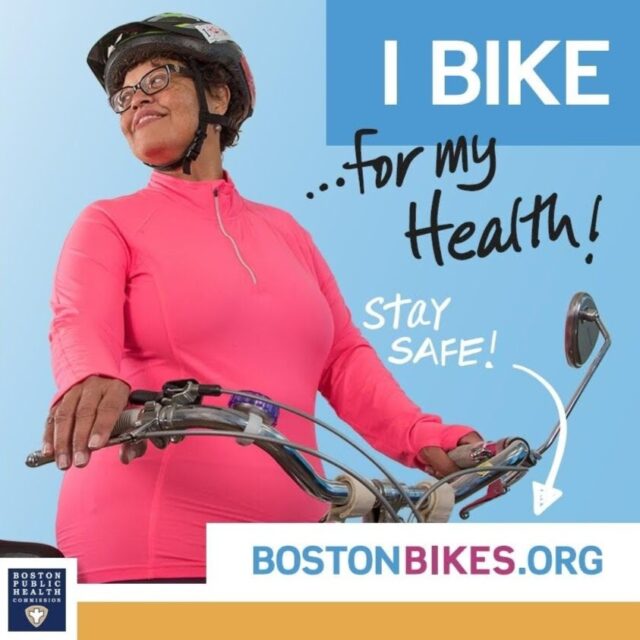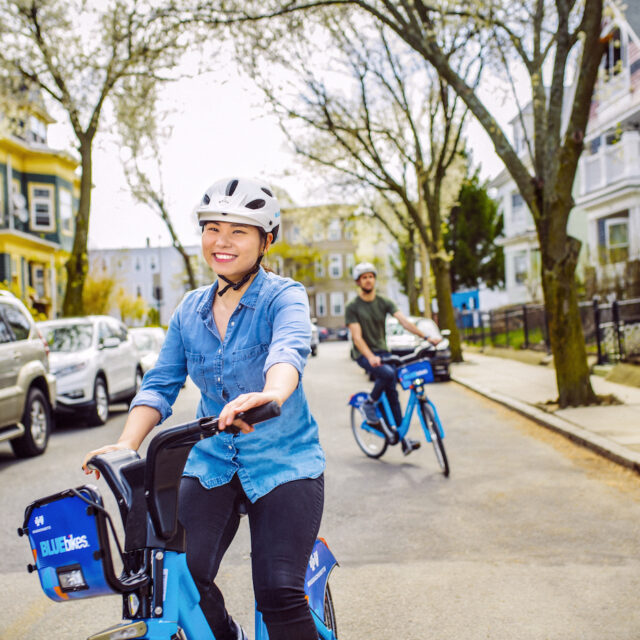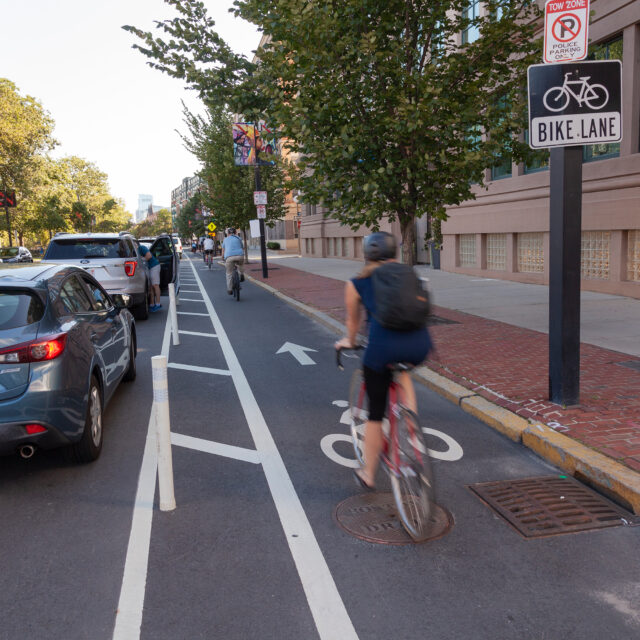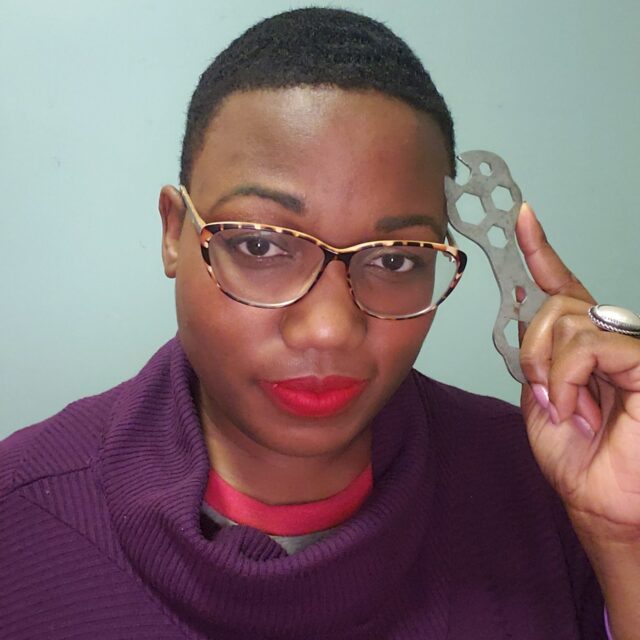Meet Boston’s Bike Mayor
by Kiran Herbert, Communications Manager
March 16, 2022
Vivian Ortiz has a passion for getting Black, Latino, and older women bicycling — and for transforming the infrastructure that allows them to do so comfortably.

Vivian Ortiz is the Bicycle Mayor of Boston.
Around the world, there are certain people that serve as catalysts for bicycling, working to make our cities more livable by pushing for progress and the interests of their communities. The global non-governmental organization BYCS, which is based in Amsterdam, has celebrated such individuals as Bicycle Mayors since 2016, dubbing them the human face and voice of cycling in their respective cities. By creating a network of changemakers, the organization hopes to accelerate a truly radical shift.
In the U.S., there are currently only six bike mayors (all women) in Austin, TX, Keene, NH, Atlanta, GA, New York City, Washington, D.C., and Boston, MA (India, by contrast, has 51). Boston’s bicycle mayor, Vivian Ortiz, was nominated and accepted into the cohort in 2020, but for half a decade she’s been helping to make bicycling in the city better and more inclusive.
Although Ortiz had a bike as a kid, she became a bicyclist later in life — she spent most of her adult life driving a car in El Paso, TX, until she moved to New York City, ditched her car, and started taking public transit at the age of 44. In 2013, as Ortiz was nearing 50, she and a friend were vacationing on Martha’s Vineyard and decided to rent bikes. Having only ever ridden a kid’s bike, Ortiz tried to peddle backwards to stop, because she’d never been on a bike with hand brakes.
“I was going really slow — I didn’t like fall, but I was like, this is really embarrassing,” says Ortiz, who signed up for a City of Boston Learn-to-Ride Clinic when she returned home. “They taught me how to balance and to get over the fear because of being much higher off the ground. And just that fear that we have as adults that you’re going to fall and something’s gonna happen.”
The city’s clinics were designed for women and gender-nonconforming people to learn to ride in a safe and nonjudgemental environment. While the class taught Ortiz the basics and a friend gifted her a three-speed bike to ride — a 1970s Huffy Regatta — it wasn’t until a few years later that she learned how to shift gears. Due to a lack of infrastructure, she also remained afraid of riding on the street in her neighborhood.
“I live in Mattapan, which is one of the neighborhoods of Boston where folks don’t think that people bike,” says Ortiz. “It’s a predominantly black community and there’s really no bike facilities.”
Ortiz caught the bike bug, however, and after a friend brought her along to a group ride — the Boston Bike Party — she became a regular, gradually gaining confidence with biking on city streets and at night. In 2016, Ortiz was asked to be a spokesmodel for a campaign called “I Bike! Boston,” where her smiling face helped promote bicycling as a form of active transportation to help address health disparities in Boston neighborhoods.
“I was the 50-year-old Puerto Rican on the billboard across from the police station,” says Ortiz. “ By the end of the campaign, people recognized me.”
One bus driver dubbed her “That Bike Lady” and the name stuck. Around the same time, Ortiz transitioned to being a commuter cyclist. She was working as a coordinator with the Healthy Community Champions (HCC) with Mattapan Food & Fitness Coalition, which although a natural fit for promoting bicycling, made her realize that active transportation only works if people have access to a bike and there’s safe infrastructure around. Her lived experience naturally led her to advocacy.
“I went to a transportation planner conference and I made a comment about outreach: ‘You need to go to churches, you need to go to community centers,’” says Ortiz. “People looked at me like what I’d said was really profound. But if you only know your own community, and you’ve been riding since a kid, I get why you might think that way.”
In 2017, after Ortiz attended her first National Bike Summit, she traveled to Boise to become a League Cycling Instructor. Soon, she was instructing others on bike basics —including for the city program where she first learned — with a particular emphasis on helping Black, Latina, and older women rediscover the joy of riding. In 2019, Ortiz began leading a Monday night bike ride in Mattapan along the Neponset River Greenway path, a nearby protected, mutli-use trail, empowering new riders, cultivating community, and helping folks build stamina. She’ll be starting those rides again next month.
Blue Bikes, Boston’s public bike share system, has supported Ortiz by offering free passes and helmets so that riders can learn without the obligation of finding their own gear. At the end of the Learn to Ride clinics, participants also get free bike share passes. Blue Bikes and Boston has undergone one of the most comprehensive expansion programs — reaching every city neighborhood — and it first came to Mattapan in September 2018.
“[Mattapan] had heard about Blue Bikes and the attitude was, we’re not getting them because we’re in a Black neighborhood,” says Ortiz, who took time to explain to people how a bike share system expands (neighborhood by neighborhood, so it remains connected) and to help the city with station siting and engagement when the time came. “We said, ‘Hell no, that street is dangerous,” and the city listened.”
Officials have also been responsive when it comes to local marketing efforts, as well as feedback regarding things like explicitly noting the $25 hold fee, or the fact that you can get charged $1,300 for not docking a bike correctly. In community conversations regarding infrastructure, Ortiz takes the time to explain terms like “flex post” and “road diet,” consistently pushing the city to do a better job of engaging with people who don’t go to public meetings or speak other languages that are not English. She also takes time to question her neighbors who want the city to do something about “the traffic” but generally oppose any change that takes away space for motor vehicles and gives it to people walking, using mobility-assisted devices, and especially biking,
“One of the benefits about being older is that I don’t care as much about how I come across,” says Ortiz, who stands out in most transportation planning crowds.
Most of the time, Ortiz projects an air of enthusiasm and contagious excitement for bicycling, by promoting bike share and bike infrastructure as a thing being done for a community, not to them. Ortiz works as one of the outreach coordinators for the Massachusetts Safe Routes to School Program and serves on several boards, including Livable Streets Alliance and the League of the American Bicyclists. When the leaders of the active transportation advocacy groups in Boston asked if she’d be interested in being nominated as the People’s Bike Mayor of Boston, she was flattered but reminded them that she has a full-time job and way too many community projects she’s involved in. Vivian knows the bike mayors in New York City and Atlanta and they’re “full-time” mayors.
When she participates in video calls with mayors in Latin America, North America, or across the globe, she’s always amazed at the great work these folks are doing around the world. “I often feel that I’m not doing enough. But then I think, what I’m doing on a one-on-one basis is still making change,” says Ortiz. “We’re all fighting the same thing regardless of the uniqueness of where we live.”
That “thing” is car culture, traffic congestion, and the lack of and/or inequitable distribution of bicycling infrastructure. It’s the mindset that biking is just for fit, white men in spandex, or that our streets will never be safe enough for kids to ride. It’s the very idea that one person can’t make a difference, or that we won’t be heard in a room full of people that don’t look and think like us.
“Being the only one can sometimes be hard,” says Ortiz. “But I realized, I’m not the only one, I’m the first one. If somebody doesn’t say, ‘We need to change this,’ then it’s always going to stay the same.”
Interested in learning more about Vivian Ortiz and six other Boston women who pedal around Boston after dark? Check out the new film, “Women Who Bike at Night.”



